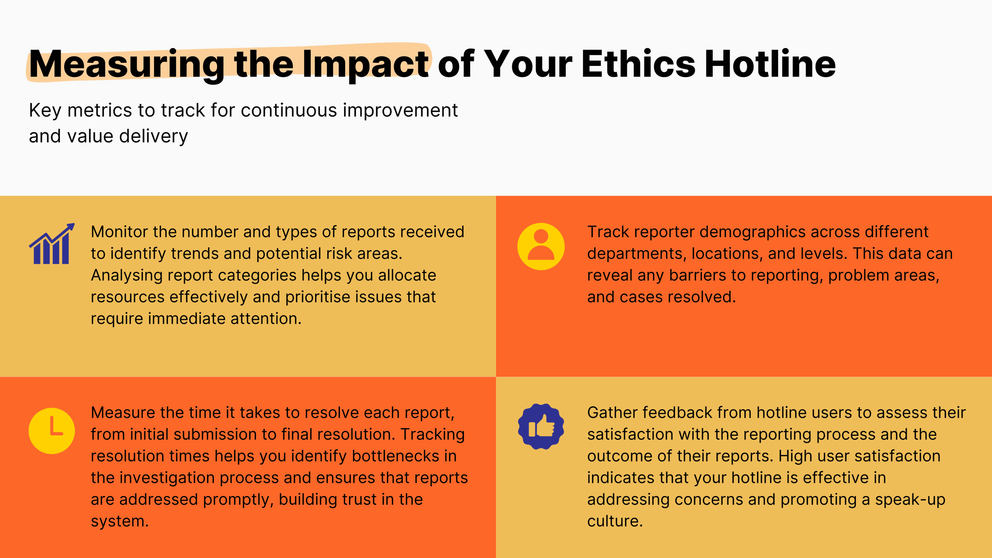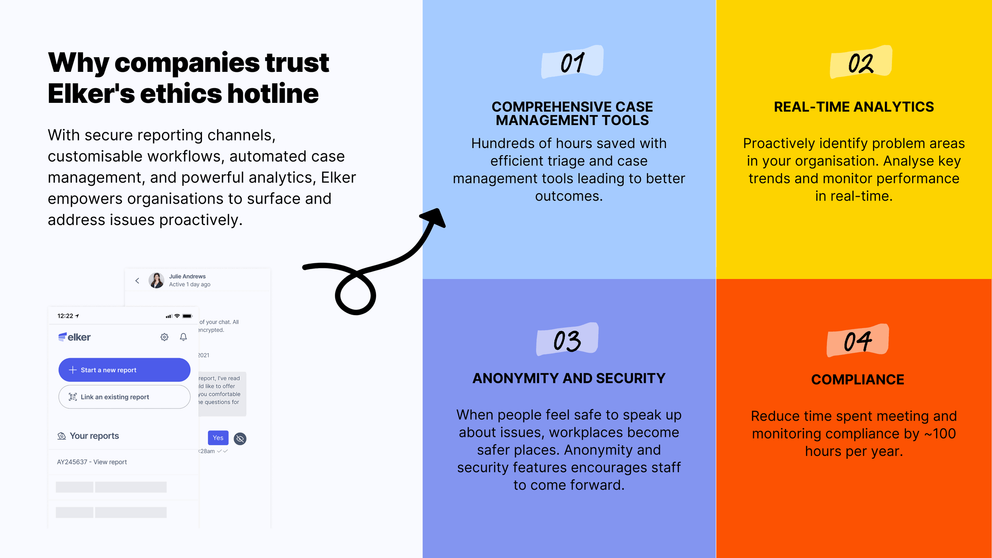How to Set Up an Ethics Hotline – Best Practice for Managing Integrity
Ethics hotlines have become an essential tool for organisations committed to fostering a culture of integrity and transparency. In this article, we'll explore the key considerations for setting up an effective ethics hotline and how digital solutions can help organisations manage risk proactively.

What is an ethics hotline?
An ethics hotline (also known as a compliance hotline or whistleblower hotline) is a confidential reporting mechanism that allows employees to raise concerns about unethical, illegal, or improper conduct within their organisation.
While traditionally associated with phone-based reporting, modern ethics hotlines have evolved to encompass a range of digital reporting channels, making it easier than ever for individuals to voice their concerns.
The primary purpose of an ethics hotline is to provide a safe and accessible platform for reporting issues that might otherwise go unnoticed or unreported. By ensuring confidentiality and anonymity, ethics hotlines empower individuals to speak up about potential wrongdoing without fear of retaliation.
Research has shown that organisations with effective hotlines experience less misconduct and are better equipped to detect and address issues early. A study by the Association of Certified Fraud Examiners found that companies with hotlines detected fraud 33% faster and experienced 16% lower losses than those without.
Importance in maintaining ethical workplace conduct
Ethics hotlines play a crucial role in maintaining ethical conduct within the workplace. By providing a clear channel for reporting concerns, these systems:
- Demonstrate an organisation's commitment to ethical behaviour
- Encourage transparency and accountability at all levels of the company
- Help identify and address potential issues before they escalate
- Foster a culture of trust and integrity among employees
From a risk management perspective, ethics hotlines serve as an early warning system, enabling organisations to detect potential misconduct and noncompliance issues before they escalate. This proactive approach aligns with the global shift towards preventive risk management, as reflected in Australia's Aged Care Quality Standards and the Respect@Work reforms.
Difference between ethics hotlines and compliance hotlines
While the terms "ethics hotline" and "compliance hotline" are often used interchangeably, there are subtle differences between the two:
- Ethics hotlines: focus on broader ethical concerns and violations of the company's code of conduct. They may cover issues such as conflicts of interest, discrimination, harassment, or unethical business practices.
- Compliance hotlines: deal with regulatory compliance issues and legal violations. Reporting channels may be specific to industry regulations, financial reporting, or adherence to laws and standards.
In practice, many organisations combine ethics and compliance reporting into a single system, with separate reporting channels for whistleblowing and one for ethical concerns.
Common ethical dilemmas reported through hotlines
Ethics hotlines receive reports on a wide range of issues, from minor policy infractions to serious legal violations. According to the 2022 Ethics & Compliance Hotline Benchmark Report, the most common report categories were:
- HR, diversity, and workplace respect (25%)
- Environment, health and safety (17%)
- Privacy (12%)
- Customer relations, business quality (16%)
- Compliance, regulatory, legal (7%)
- Unfairness, management issues (7%)
- Finance and billing (5%)
- Discrimination, harasment, relatiation (4%)
- Fraud, theft, property damage (3%)
- Staffing issues (5%)
While every organisation is unique, these broad categories cover many of the ethical issues that employees may encounter in their organisations.

Setting up an ethics hotline: best practices
Implementing an effective ethics hotline requires careful planning and execution. Here are some key best practices:
Develop a comprehensive whistleblowing policy and procedures: Create a clear and comprehensive policy that outlines the purpose, scope, and processes of your ethics hotline. The policy should define the types of issues that should be reported, guide how to make a report and explain the investigation and resolution process. Ensure that the policy is regularly reviewed and updated to reflect changes in regulations and best practices.
Implement a customisable digital ethics hotline solution: Choose a digital ethics hotline that integrates seamlessly with your organisation's existing systems and software. Look for a solution that offers customisation options to meet the specific compliance requirements of your industry and your organisation's unique needs. A digital hotline should provide a user-friendly interface, robust security features, and the ability to generate detailed reports and analytics.
Engage employees through targeted communication and training: Develop a strategic communication plan to promote the availability and value of the ethics hotline to all employees. Use various channels, such as email, intranet, posters, and team meetings, to raise awareness and encourage reporting. Provide targeted training to employees on how to recognise and report ethical issues, and train managers on how to handle reports effectively and maintain confidentiality.
Ensure accessibility and confidentiality across multiple reporting channels: Provide multiple secure reporting channels, such as web forms, mobile apps, and phone lines, to ensure that all employees can easily access the hotline regardless of their location or preferred communication method. Implement strict confidentiality measures to protect reporter anonymity and prevent retaliation. Ensure that your hotline solution complies with relevant data privacy and protection regulations.
Establish efficient and impartial report handling and investigation protocols: Develop clear protocols for triaging, investigating, and resolving reports in a timely and consistent manner. Assign a dedicated team of impartial investigators to handle reports and conduct thorough investigations. Establish guidelines for communicating with reporters throughout the process and providing timely updates on the status of their reports. Document all steps taken during the investigation and resolution process for auditing purposes.
Leverage data for continuous improvement and proactive risk management: Regularly analyse hotline data to identify trends, emerging risks, and opportunities for improvement in your organisation's ethical culture and compliance program. Use data-driven insights to inform decision-making and develop targeted initiatives to address identified issues. Report key hotline metrics to senior leadership and the board to maintain visibility, drive accountability, and demonstrate the effectiveness of your ethics and compliance efforts.
Overcoming challenges in your ethics and compliance hotline
Implementing an effective ethics hotline is not without challenges. Common obstacles include:
- Overcoming fear and mistrust among employees
- Inconsistent communication and training
- Lack of leadership buy-in
- Inadequate resourcing for investigations
- Difficulty maintaining confidentiality
- Inconsistent, unclear or inaccessible company policy on whistleblowing
- Managing global hotlines across multiple jurisdictions
To address these challenges, organisations need to take a holistic approach that focuses on building trust, securing leadership support, investing in robust processes, and continuously monitoring and improving hotline performance. Partnering with an experienced provider like Elker can help organisations navigate these complexities and optimise their hotline programs.
The role of leadership in a successful ethics hotline
Leaders play a vital role in the success of an ethics hotline. When leaders visibly embrace and promote the hotline, it demonstrates that speaking up is valued and expected. However, leadership support must go beyond mere lip service. Leaders must ensure that reports are taken seriously, investigated thoroughly, and resolved appropriately. They must also hold wrongdoers accountable and communicate outcomes transparently while protecting reporter confidentiality.
Proactive leaders leverage hotline data for risk sensing and mitigation. By regularly reviewing trends and patterns, they can identify emerging issues and take action to prevent them from escalating. This approach aligns with the preventive focus of Australia's regulatory landscape, such as the positive duty to eliminate sexual harassment under the Respect@Work reforms.
As observed by the Institute of Business Ethics, "The single biggest factor determining the effectiveness of a speak-up arrangement is the tone from the top."

Measuring the effectiveness of your ethics hotline
Measuring and monitoring hotline performance is essential for ensuring that the program is delivering value and driving continuous improvement. Key metrics to track include:
- Number and types of reports received
- Reporter demographics
- Time to resolution
- Substantiation rates
- User satisfaction
Regular reporting on these metrics helps to maintain accountability, identify areas for improvement, and demonstrate the impact of the hotline program. Elker's digital ethics hotline includes robust analytics and reporting features, making it easy for organisations to track and optimise performance.
According to KPMG's 2021 Global CEO Outlook, 77% of Australian CEOs believe that measuring and reporting on their company's environmental, social, and governance (ESG) indicators will be a key factor in building and maintaining trust with stakeholders. Ethics hotline metrics are a critical component of an organisation's overall ESG performance.
Legal considerations for ethics hotlines
Ethics hotlines operate within a complex web of legal and regulatory requirements. In Australia, key considerations include:
- The Corporations Act whistleblower protections require certain companies to have a compliant whistleblower policy and protect eligible whistleblowers from detriment.
- The Respect@Work reforms introduce a positive duty for employers to eliminate sex discrimination, sexual harassment, and victimisation as far as possible.
- The Aged Care Quality Standards and the new Aged Care Act emphasise continuous improvement, feedback and complaints, and open disclosure.
Organisations should work closely with legal counsel to ensure that their hotlines comply with all relevant laws and regulations. Elker's configurable platform can also support compliance with various global requirements.
Integrating ethics hotlines into company culture
An ethics hotline is most effective when it is integrated into a broader ethical culture that values integrity, openness, and psychological safety. Building such a culture requires consistent communication, training, and reinforcement of ethical values and behaviours.
Leaders play a critical role in modelling ethical conduct and creating an environment where employees feel empowered to raise concerns without fear of reprisal. By leveraging their ethics hotlines as part of a comprehensive approach to ethics and compliance, organisations can build trust, mitigate risk, and drive long-term success.

Why companies trust Elker's ethics hotline
Elker's digital ethics hotline is a cutting-edge platform that helps organisations elevate their ethics and compliance programs. With secure reporting channels, customisable workflows, automated case management, and powerful analytics, Elker empowers organisations to surface and address issues proactively.
Our expert team works closely with clients to understand their unique needs, configure the system, and provide ongoing training and support. By partnering with Elker, organisations can efficiently manage risk, meet evolving regulatory requirements, and foster a culture of integrity and transparency.
To learn more about how Elker can help your organisation achieve its ethics and compliance goals, book a demo or request a quote today.